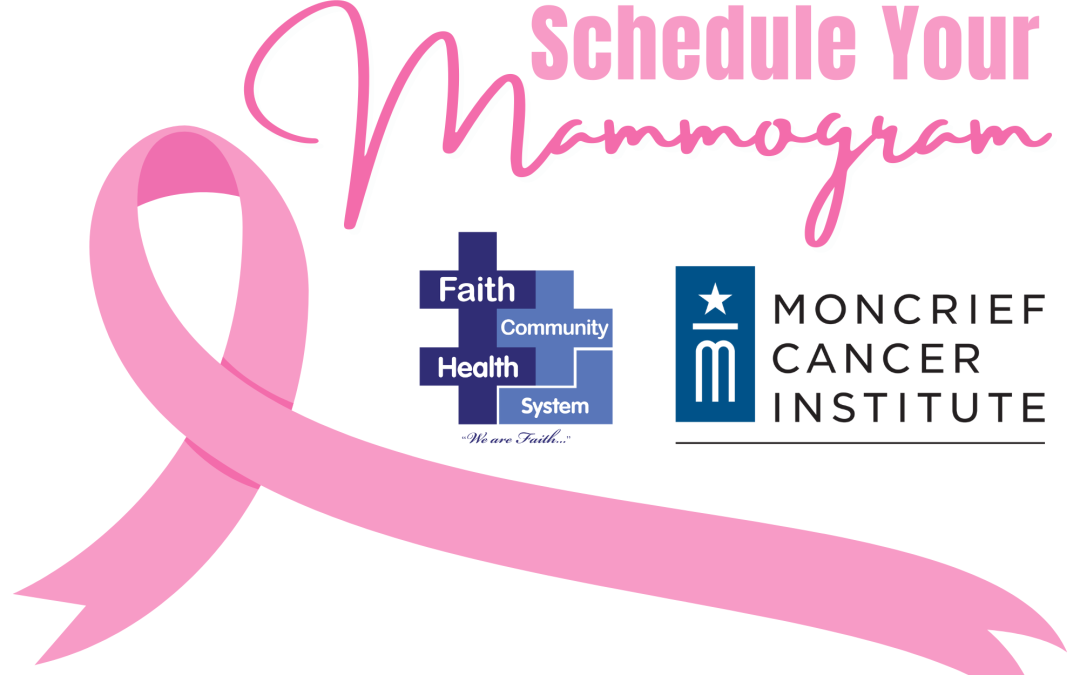October was Breast Cancer Awareness Month. If you are like many women, you put off making your mammogram appointment for any number of reasons.
In our neck of the woods, many families find themselves traveling for healthcare – particularly for specialized screenings. If a long drive has been holding you back from getting your mammogram, you’re in luck.
Faith Community Health System will be hosting Moncrief’s Mobile Mammogram Unit on Saturday, Nov. 4. All members of the community are invited to call 800-405-7739 to make an appointment.
“Early detection saves lives,” said Paula Edwards, Chief Nursing Officer at Faith Community Health System. “We view every member of our community as a member of the Faith family. You are important to us. Please take this opportunity to make an appointment for your mammogram – and bring your friends and neighbors, too.”
The Risks are Real
No one wants to discuss the mortality associated with cancer of all varieties. This is especially true when it comes to breast cancer. According to the Centers for Disease Control and Prevention (CDC), more than 240,000 people in the United States are diagnosed with breast cancer annually; this includes about 2,100 men. Far too many of those (over 40,000) don’t survive their brave fight each year.
While breast cancer can occur in people who have absolutely no risk factors, the vast majority of those diagnosed with the disease fall into a high risk group. These include, according to the CDC:
-
Having a first degree relative who has been diagnosed with cancer
-
Those who have had children after age 30.
-
Taking hormone therapy
-
Being overweight (especially after menopause)
-
Excessive alcohol consumption
3 Reasons Women Procrastinate Getting a Mammogram
-
“People tell me it hurts!” First off, pain is in the “eye” of the beholder. Everyone’s pain tolerance is different.
However, trained technicians will make you as comfortable as possible. And, truly, the actual screening time is seconds. Even if you don’t have a fun time (it’s not meant to be a fun time!), you’ll be making the right health choice.
-
“I’m embarrassed!” The experienced technicians who perform mammograms are healthcare professionals. They’ve seen everything you have – and then some. Rest assured, the last thing they are paying attention to is the size and/or shape of your breasts –except as it relates to proper placement in the medical device.
-
“I’m afraid of possible bad news!” Join the club. Think about it this way: if people weren’t fearful of getting a poor reading, there wouldn’t be a need for this article!
One of the risks of getting an annual mammogram is that it’s possible you may get some unfortunate results. There’s not much that you can do about this except to make sure you get screened according to guidelines suggested by the American Cancer Society (ACS) and supported by your physician (with regard to your personal risk factors.*)
New guidelines offered by the ACS suggest women can start getting mammograms beginning at age 40. By age 45, women should absolutely be screened annually. When you turn 55, the suggested norm is to continue annual screening or switch to getting a mammogram every two years.
Talk to your physician at Faith to ensure you make the best decisions for your personal situation. Make an appointment today!
2 GREAT Reasons to Get Your Mammogram Done
-
It’s only one hour of your time. Seriously, getting the mammogram itself takes a few moments. The majority of the time spent during this screening visit involves paperwork. Taking an hour to get a screening is a small sacrifice to ensure you don’t become a statistic.
-
Get time on your side. Another aspect of time is very important as it relates to early detection. Did you know that people of color are more likely to develop breast cancer? Recent research has proven this to be true. Mammograms, like other wellness screenings including EKGs for heart disease and annual physicals including bloodwork, can discover evidence of problems at the early stages. Early diagnosis can lead to early treatment and, hopefully, a better prognosis.


